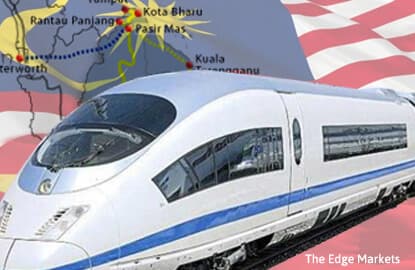
KUALA LUMPUR (Nov 2): Opposition members of Parliament today questioned the RM55 billion East Coast Rail Line (ECRL) project on several aspects, including the pricing, alleged lack of transparency, and need for the project.
Pandan MP Rafizi Ramli said the government must explain why China Communications Construction Co Ltd (CCCC) was appointed as the engineering, procurement, construction and commissioning (EPCC) contractor in a hasty manner.
"When it comes to a high value project like this, a few approval processes are usually applied to study the feasibility, namely the pre-feasibility study (PFS), feasibility study (FS) and final investment decision (FID)," he told reporters at the Parliament lobby.
"These studies involve the estimation of passengers, ticket fares, costs and other considerations that show whether the project can be carried out without burdening the people.
"Questions like how much is the suggested ticket fares, what are the increment or revision in the next 20-year period are matters that need to be clear before the government signs any contract with the Chinese government," he added.
Rafizi said Prime Minister Datuk Seri Najib Razak should table the three studies in Parliament before making any commitment to the Chinese government, adding that the opposition lawmakers would undertake their own pre-feasibility study.
"We will gather professionals to come out with a PFS on our own and present it to the people in the next 30 days," he said.
Rafizi also said Putrajaya is expected to set up a special purpose vehicle (SPV) to take up the RM55 billion soft loan from a Chinese state agency, which according to news reports is the Export-Import (Exim) Bank of China.
"This way, the MoF (Ministry of Finance) will own the SPV, and he (Najib) then does not need to seek Parliament's approval, like what they did in 1Malaysia Development Bhd before," he explained.
On Monday, Treasury secretary-general Tan Sri Mohd Irwan Serigar Abdullah confirmed to the local media that the ECRL project has been awarded to CCCC, and that the EPCC contract and a financing framework were among the agreements he would sign during his visit to China with Najib.
Mohd Irwan Serigar also reportedly said that while the EPCC contract was awarded to CCCC, the financing agreement will be arranged with Exim Bank of China.
Meanwhile, Kuala Krai MP Dr Hatta Ramli questioned the need for ECRL. He said the demand for rail services may not justify the huge investment, adding that the project appeared to be overpriced.
"The supply of rail services must commensurate the demand for it. From what I understand, the Kelantan people are demanding more road access for them to travel rather than railway," said the lawmaker whose constituency is in that state.
The ECRL is a 600km long double track railway system connecting Kuala Lumpur to Tumpat, about 70km north of Kuala Krai.
Bayan Baru MP Sim Tze Tzin, on the other hand, queried the RM55 billion cost of the ECRL project, describing it as "the world's most expensive railway system".
He referred to the 377km Yichang-Wanzhou Railway project in China which is dubbed 'the most difficult rail project ever constructed in China', mainly due to the difficult terrain in the south-western area of Hubei and the eastern part of the Chongqing municipality in the Wanzhou district.
"Even for a project like this, the cost per km amounted to US$9.01 million, or RM36 million, as compared with RM92 million for ECRL, which is 250% higher," he pointed out.
Minister in Prime Minister Department Datuk Seri Wee Ka Siong, meanwhile, believes the government's partnership with CCCC for the ECRL project is driven by the China's technical expertise and favourable financial terms, but he declined to elaborate as he has yet to obtain more details about the agreement.
"For the demand of ECRL, there are many perspectives of seeing this. When we built North-South Highway, there were also parties that questioned the rationale of it, but today we cannot live without it," he said.